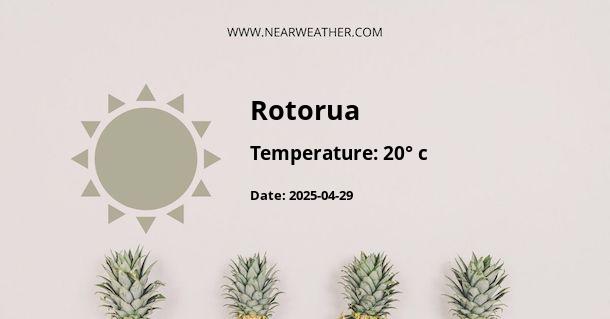Weather and Climate in Rotorua, New Zealand
Rotorua, located on the North Island of New Zealand, is known for its geothermal wonders, Maori culture, and stunning natural landscapes. The city experiences a temperate maritime climate, with warm summers and mild winters. The weather in Rotorua is influenced by its proximity to the Pacific Ocean, as well as its unique geographical features.
Seasonal Temperatures
Let's take a closer look at the seasonal temperatures in Rotorua:
| Season | Average High (°C) | Average Low (°C) |
|---|---|---|
| Summer (December - February) | 24°C | 12°C |
| Autumn (March - May) | 19°C | 8°C |
| Winter (June - August) | 13°C | 3°C |
| Spring (September - November) | 18°C | 7°C |
As the table shows, Rotorua experiences pleasant temperatures throughout the year, with warm summers and mild winters. However, it's important to note that the city's weather can be quite changeable due to its geothermal activity.
Rainfall and Sunshine
Rotorua receives a moderate amount of rainfall spread relatively evenly throughout the year. The city experiences an average of 1,400 millimeters of rainfall annually. The wettest months are typically from May to August, while the summer months from December to February tend to be drier.
When it comes to sunshine, Rotorua enjoys a good amount of it, with an average of around 2,100 hours of sunshine annually. This translates to plenty of opportunities for outdoor activities and exploration, making it an attractive destination for tourists and outdoor enthusiasts.
Unique Weather Phenomena
One of the most fascinating aspects of Rotorua's weather is its association with geothermal activity. The city is home to geysers, hot springs, and mud pools, which can have an impact on local weather patterns. For instance, the release of steam and heat from geysers can create localized microclimates, resulting in unique weather phenomena within the city and its surrounding areas.
Additionally, the geothermal activity in Rotorua contributes to the city's distinctive "rotten eggs" smell, caused by the presence of hydrogen sulfide in the air. While this smell is harmless, it is a testament to the city's geothermal energy and its influence on Rotorua's overall environment.
Conclusion
In conclusion, Rotorua, New Zealand, offers a diverse and fascinating climate influenced by its geothermal features and maritime surroundings. With its comfortable temperatures, moderate rainfall, and abundance of sunshine, the city provides an inviting environment for both residents and visitors alike. Whether you're interested in exploring the geothermal wonders or indulging in outdoor activities, Rotorua's unique climate sets the stage for an unforgettable experience in this captivating destination.
A - Rotorua's Latitude is -38.138741 & Longitude is 176.245163.
A - Weather in Rotorua is 20° today.
A - Climate Conditions in Rotorua shows overcast clouds today.
A - Humidity in Rotorua is 63% today.
A - Wind speed in Rotorua is 12.92 km/h, flowing at 55° wind direction. today.
